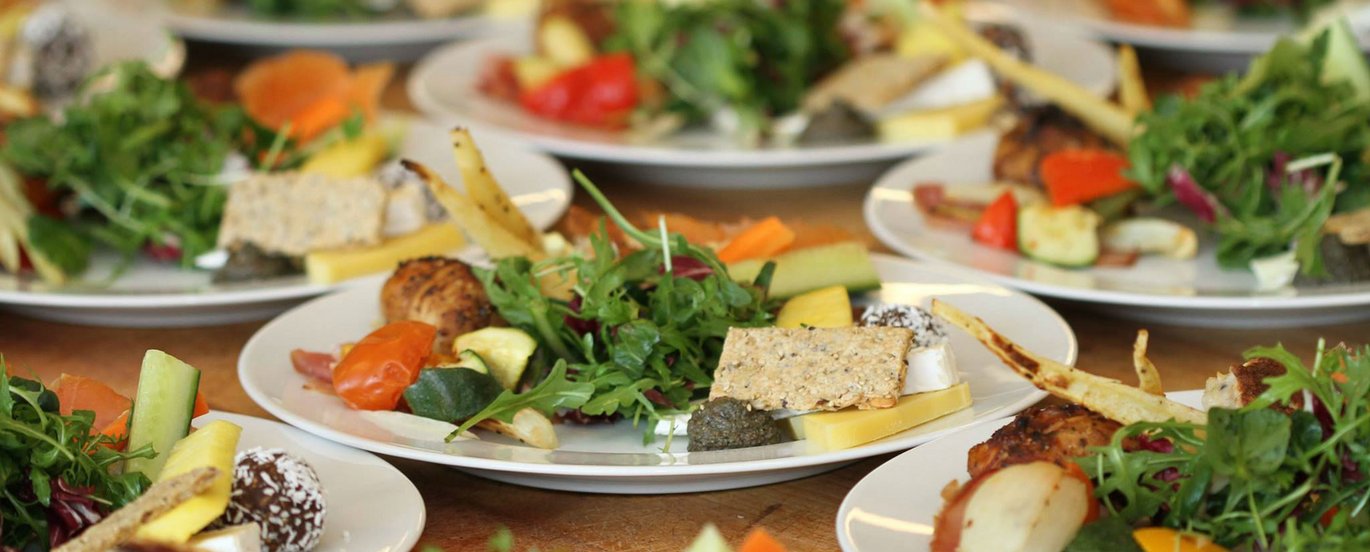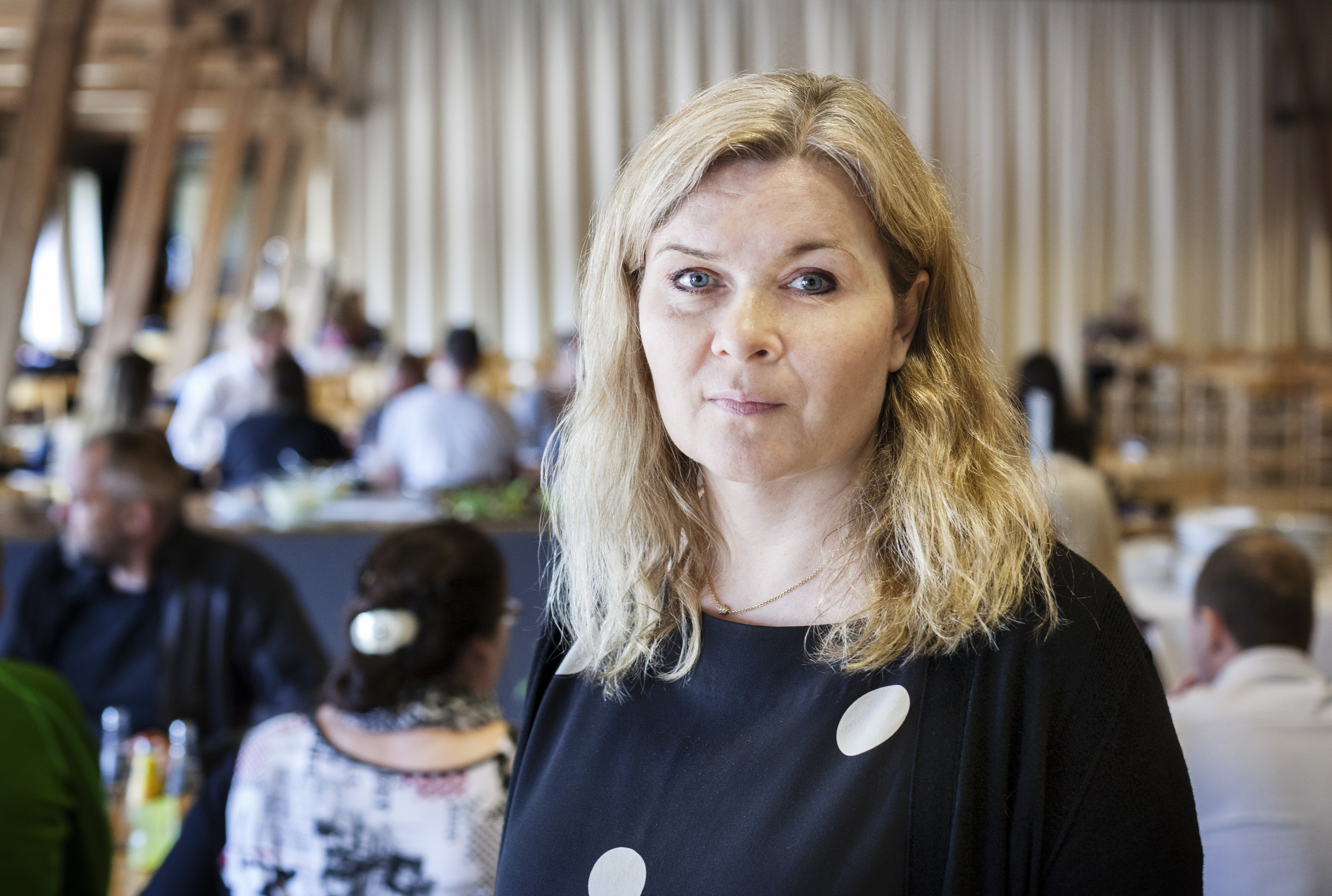»Many people still react strongly to the word ‘organic’«
In just over a year, organic ingredients have been introduced in more than one third of the food in the Studenterhusfonden’s eleven cafeterias. According to the Studenterhusfonden's director, to succeed in meeting the target of ninety per cent organic products in 2020, it is necessary to gradually cut down on meat so as not to frighten poor and fast food loving students away.


Is the food in your cafeteria a little greener? Does the dish of the day taste more natural? And does the bread have a crispier crust? Then it’s because Kristina Kristensen has come a long way in her mission.
In March last year, the former cafeteria manager at Vestas took up the position of director of the Studenterhusfonden, which operates 11 out of AU's 15 cafeterias.
When she said yes to the job, she also accepted the challenge to of making ninety per cent of the food organic by 2020. This also means no more semi-manufactured products and bake-off-bread; the food is now produced from scratch using fresh and sustainable ingredients.
In just over a year, Kristina Kristensen and her staff have succeeded in reaching more than thirty per cent organic ingredients. And the director’s assessment is that reaching the goal is realistic, even though she admits that it is a large organic mouthful.
"If you have unlimited finances, you can do a one-to-one conversion to organic products. But it would be somewhere between thirty and forty per cent more expensive to prepare the food. Our goal is that it shouldn’t be more expensive and that the customers shouldn’t have to pay more than they do today," she says.
Less meat and more seasonal fruit and vegetables
This means saving on meat, compared to previously. In addition, there is now more focus on seasonal fruit and vegetables, says Kristina Kristensen.
"Our guests don’t find summer vegetables in the winter, and we will not fly fruit in from exotic countries. On the other hand, we have some good, reliable suppliers who can give us good prices, depending on what they have in stock here and now," she says.
It is also important to reduce waste as much as possible, if the Studenterhusfonden is to achieve its ambitious organic goal, says the director.
Organic products under the radar
Though many students are interested in food that is good to burn and provides the right kind of energy, it still takes time to get the customers used to the new organic recipe, says Kristensen. For that reason, she is careful not to send out too many healthy messages too soon.
"Many people still react strongly to the word ‘organic’, so we have deliberately not done much marketing yet. It’s easier to accept the changes if you still hold onto something recognisable," she says.
For the same reason, it is very important to keep the prices down, she explains.
"If I raise prices now, I know what I’ll hear, as it will confirm all the prejudices there are about our entire project."
Humanists are into health, computer nerds are into fries
The healthy development has been received in different ways in Studenterhusfonden’s cafeterias. Among the humanists in the Nobel Park cafeteria, organics is a hit. They are very conscious of what they eat and also want to eat vegetarian food, says Kristina Kristensen.
On the other hand, there has been a fall in turnover in the Social Sciences cafeteria and in the IT City.
"I don't necessarily think it has anything to do with organic products, but more that what we’re offering in those particular cafeterias is a little too healthy compared to what people want in those cafeterias."
Students have had a particularly difficult time accepting that the French fries had been replaced by proper oven-baked potatoes at the IT City cafeteria, she says.
Voxpop: Good and healthy, or ... ?
Omnibus has asked three users in the Nobel Park cafeteria what they think about the changes in the menu. All three visit the cafeteria at least once a week.
 | "In my view, taste is more important than whether it’s healthy. But they’ve managed to balance things so that the food tastes good and is healthy. Generally, I think it’s become a better cafeteria with more variation. The basic idea of organic food – more respect for both animals and cultivation methods – is sympathetic. I think the prices have increased a little bit because of it, but I think they’re fair. Though I miss the focaccia they used to have. It was cheap and I often bought some if I needed something to get through a lecture. They were probably not healthy, but they were quick and cheap." Svend Bjerring Schmidt. |
 | "The bread is really good now. The quality is like Emmerys (bakery and restaurant in Aarhus, ed.). And their coconut macaroons are even better. I noticed they announced there would be more organic food. They also said they’d switched to making things from scratch. That’s something you can taste. Both the quality and selection have increased markedly. We often praise the cafeteria staff. They make our everyday lives better." Lotte Kofod Ludvigsen. |
 | "I could never be bothered to buy the hot meals before, but I do now. The food does not seem mass-produced and dull. The idea of organic products is fine, provided that they take into account that their customers are students living on a grant. Of course we want good quality and taste, if we can afford to pay for it. But if organic means that your budget is put under pressure and you have to cut back, then it doesn’t make any difference. Because you won’t buy it." Thomas James Pheasant. |
Facts:
Taking over a loss-maker
When Kristina Kristensen took over the director’s chair at the Studenterhusfonden last summer, she also took over a loss-making business.
The bottom line has been in the red since 2011, when the results for the year showed a loss of DKK 101,742. In 2012, the loss rose to DKK 279,946 and in 2013 to DKK 385,694.
Kristina Kristensen hopes to be able to reverse the trend, so that 2015 as a minimum breaks even.
"Building a healthy business requires so much of us. Perhaps we could do with a couple of extra employees here and now, but it is necessary to make savings, because we simply must avoid making a loss this year," she says.
Studenterhusfonden’s cafeterias at AU
Stakladen, Fredrik Nielsensvej 2
The Nobel Park cafeteria, Jens Chr. Skous Vej 2
INCUBA Åbogade (IT City), Åbogade 15
IT-Corner, Finlandsgade 21-23
The School of Dentistry cafeteria, Vennelyst Boulevard 8
The Social Sciences cafeteria, Bartholins Allé
The Trøjborg cafeteria, Villemoesgade 15
The Theology cafeteria, Taasingegade 3
INCUBA Skejby, Brendstrupgårdsvej 102
Moesgaard cafeteria, Moesgaard Allé 70
Dale’s Café, Høegh-Guldbergs Gade 4
DKK 1.7 million to supplementary training in organic food production
From January 2016, Kristina Kristensen will send her staff on supplementary training in organic food production. After applying for funding from the Danish Business Authority and the Nature Agency, she has received DKK 1.7 million for this purpose.
Translated by Peter Lambourne.

